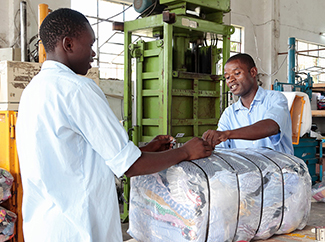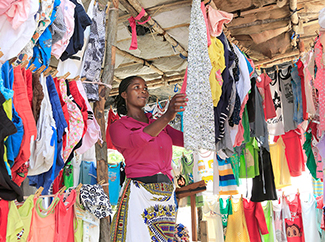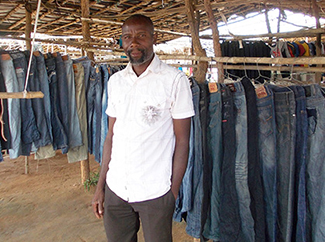consent_cookie
Duración: 1 year
Stores the user's cookie consent state
16-05-2025
In recent years, environmental organisations have published research on the fate of clothes when they are deposited in a separate collection container. The result is bleak: it paints a picture in which ‘garments that cost less and less and are of poorer quality, after being discarded (in Spain), travel thousands of kilometres in search of a second life that almost never comes’.
This is the prevailing story that, with the aim of denouncing the fast fashion industry and the linear model of overproduction, hyper-consumption and throw-away, harms the management entities that work in the second-hand clothing sector. "There is another life beyond the mountains of clothes in Ghana or Kenya. The data and the results of the work of serious and responsible management entities dismantle this partial and catastrophic story", says Humana.
On World Recycling Day, which is celebrated every 17 May, Humana, with 38 years of experience in the management and export of used textiles, recognises a serious waste management deficit in general and an environmental problem generated by textiles in certain locations in Africa, and is concerned about ‘the effects of this problem on the perception and reputation of the global used clothing market’, in the words of Humana's Director of Projects and External Relations, Rafael Mas, who adds: ‘With information based on sensationalism and without a deeper analysis, we run the risk of the population being left with the idea that sending used clothing to Africa is reprehensible and should be avoided.’
"Working intensively on the global market for second-hand textile products allows us to learn the reality on the ground: despite the prevailing narrative, used clothing is a valuable and beneficial resource on many levels. We will all lose out if we indiscriminately repress this activity on the basis of the unfounded generalisation that all used clothing is rubbish," says the organisation's representative.
The route of the clothes from Spain to Mozambique
The route the clothes take to Mozambique is as follows: Humana compacts the clothes into bales of between 400 and 500 kg at its plants in Leganés (Madrid) and l'Ametlla del Vallès (Barcelona), and sends them by ship to the African country. ADPP Mozambique, the organisation's local partner, receives it, sorts it again (in up to 72 different categories or qualities) and sells it in its own shops or packs it in bales of 15 kg to 45 kg to sell it to small traders, who sell the garments in their own shops or in local markets.
Mozambique is one of the poorest countries in the world (in 2022 it ranked 185 out of 189 countries assessed by the Human Development Index). The resources obtained by the African entity with this management finance its activity, endorsed by the Mozambican government, as well as the development cooperation programmes that it carries out autonomously.
‘It is reductionist and condescending to consider that the export of used clothing to Africa is unidirectional and an imposition from North to South, something like a vestige of colonialism’, says Rafael Mas, who adds: "The actors in this value chain are diverse: from social economy organisations that collect clothes to the microentrepreneurs who sell them in the markets, passing through commercial intermediaries (customs, transporters, accountants...) and local consumers. In addition, there are many tailors in the local markets serving the sellers, repairing, modifying and extending the life of the garments.
Several recent studies confirm that the used clothing sector in Africa is a factor of economic dynamism:
‘Humana does not make donations (except in cases of emergency) but exports the clothes to be sold at low prices to local traders in order to meet the demand for clothing, boost local economic activity and generate resources for development,’ says Rafael Mas. ‘By selling the clothes at affordable prices to the population, we achieve greater dignity for the people, the creation of stable jobs in the destination countries, the generation of economic flow and the elimination of potential mafias that could arise if the clothes were given away,’ he says.


